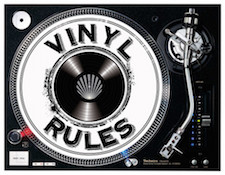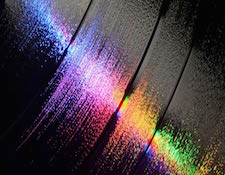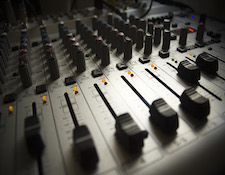It’s the time of year for saving money!
Anyone who’s spent any time looking through audiophile websites or Facebook audio groups has probably seen an exchange between participants that starts somewhat civilly but quickly degenerates into verbal sparring, populated by exclamations such as, “Vinyl Rules!” or “Digital Sucks!” Unfortunately for those of us who value rational conversations, such exclamations do little to illuminate readers about the why’s and how’s of vinyl’s superiority.
 Last week at a family party, my niece’s 20-something friend said during a tour of the new house, “Wow, look at all the vinyl!” as she looked at my 30+ boxes of records, “They sound warmer than digital, right?” DILEMA! DILEMA! flashed inside my brain – do I sit her down and explain why her last statement was false or do I just smile and nod? A family party isn’t the best place for a verbal primer on the fallacy of analog’s purported “warmth” so I said, “Actually, that’s not always true.” and left it at that.
Last week at a family party, my niece’s 20-something friend said during a tour of the new house, “Wow, look at all the vinyl!” as she looked at my 30+ boxes of records, “They sound warmer than digital, right?” DILEMA! DILEMA! flashed inside my brain – do I sit her down and explain why her last statement was false or do I just smile and nod? A family party isn’t the best place for a verbal primer on the fallacy of analog’s purported “warmth” so I said, “Actually, that’s not always true.” and left it at that.
But, unfettered by social conventions and time restraints I can address this question head-on. In my humble opinion vinyl and analog tape are not better than high-resolution digital. And I’ll even go out on a limb and state that if Lewis Layton (RCA Living Stereo recording engineer) had access to high-resolution digital recorders when he made his great recordings of the Boston and Chicago symphony orchestras for RCA (impossible without time-travel) they would have been even better than they are. But that’s not because high-resolution digital is technically superior, but because someone with Layton’s skill would have been able to get the best results from high-resolution digital, just as he did from reel-to-reel analog tape, because he was a great recording engineer who knew how to bend his tools to obtain optimal sound quality.
 Even the most hard-core digital “apologist” will admit that the sound of early digitally recorded classical orchestral LPs was “yuk.” The reason they sounded so amusical was that engineers did not compensate for the differences in recording perspective between analog tape recorders and digital recorders. Analog tape adds ambience and a bit of additional space to a recording that digital recorders, regardless of whether they are PCM or DSD, do not. To get a similar spatial perspective from a digital and an analog recorder requires placing the microphones differently for each – the microphones for the digital feed need to be slightly farther away than the analog feed. On early digital recordings the engineers were so used to analog microphone placement that they did not make any adjustments for this difference. It took some trial and error before recording engineers learned how to work with digital recorders.
Even the most hard-core digital “apologist” will admit that the sound of early digitally recorded classical orchestral LPs was “yuk.” The reason they sounded so amusical was that engineers did not compensate for the differences in recording perspective between analog tape recorders and digital recorders. Analog tape adds ambience and a bit of additional space to a recording that digital recorders, regardless of whether they are PCM or DSD, do not. To get a similar spatial perspective from a digital and an analog recorder requires placing the microphones differently for each – the microphones for the digital feed need to be slightly farther away than the analog feed. On early digital recordings the engineers were so used to analog microphone placement that they did not make any adjustments for this difference. It took some trial and error before recording engineers learned how to work with digital recorders.
Ask any experienced recording engineer what the weak link in the recording chain is and they will say, “the skills and knowledge of the recording engineer.” Modern technology has given us all the tools we need to make great recordings (or terrible ones), but they require someone with the ability to use the technology optimally, which is not something you’re born with. You have to put in the time and effort to learn the capabilities and shortcomings of your gear. And merely reading the instruction book won’t do it.
 So, when someone is foolish enough to ask my opinion on which is better, analog or digital? I answer either “neither” or “both.” Because in an expert’s hands an LP can sound fantastic, as can a high resolution digital recording. Neither has an innate sonic advantage over the other that can’t be surmounted by someone with experience and talent.
So, when someone is foolish enough to ask my opinion on which is better, analog or digital? I answer either “neither” or “both.” Because in an expert’s hands an LP can sound fantastic, as can a high resolution digital recording. Neither has an innate sonic advantage over the other that can’t be surmounted by someone with experience and talent.
Analog doesn’t rule any more than digital. In the end recording engineers rule – everything else is merely gear.





